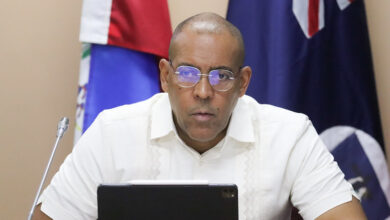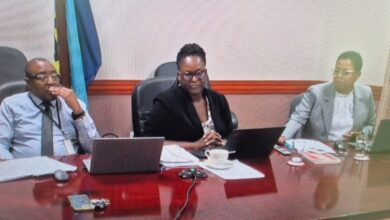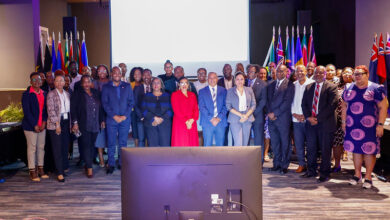The two-day Meeting of the Forty-First Council for Trade and Economic Development (COTED) concluded on Friday in Georgetown, Guyana.
A special session with representatives of the Region’s private sector led the Meeting’s heavy agenda which also included deliberations on progress related to the CARICOM Single Market and Economy (CSME), and external economic and trade matters. There were also discussions on health matters, particularly with regard to the effects of non communicable diseases on the Region’s workforce.
Please see a statement delivered by Senator, the Hon. Maxine McClean, Minister of Foreign Affairs and Foreign Trade of Barbados at the conclusion of the Meeting:
Statement by the Hon Maxine McClean, Minister of Foreign Affairs and Foreign Trade of Barbados, Chair of the Council for Trade and Economic Development (COTED), at the Press Conference at the conclusion of the Forty-First Meeting of COTED, 13 November, 2015
- The Council for Trade and Economic Development met over the past two days and I am pleased to report that there were fulsome discussions on a variety of subject areas that we considered to be critical to the growth and development of our Community.
- PRIVATE SECTOR: Given the importance that we attach to facilitating the business community as the engine of growth, our first order of business yesterday was a special session with the Region’s private sector which lasted for about four hours. There was a high level of engagement and frank dialogue that focused on investment promotion; the challenges and the priorities for the business community; doing business in the Caribbean; and the successes of various private sector development interventions. They also proposed how successes could be replicated. Unleashing the potential of micro and small enterprises; the cost and ease of doing business in the Caribbean; competitiveness;, quality assurance; security in all its ramifications (human, energy, food), Community rights; media (as part of the private sector) and communication, particularly with respect to reportage of trade and economic issues, were among the matters on which the special session deliberated.
Ministers recognize that a response to the private sector must be strategic and coherent and should address subjects such as concentration risk factors; use of cash limits for official transactions including customs; access to finance; and the development of an effective communication strategy. The CARICOM Secretariat will establish a matrix on the actionable points of the discussion and draw up an implementation schedule on those matters.
The special session attracted representation from the Caribbean Association of Industry and Commerce, the Private Sector Organisation of Jamaica, Caribbean Agri-business Association, Caribbean Poultry Association, Compete Caribbean/IDB, the Economist Intelligence Unit, Columbia Law School, Caribbean Export, Caribbean Association of Small and Medium Enterprises, and the West Indian Rum and Spirits Association.
- CARICOM Single Market: The implementation of the CARICOM Single Market and Economy (CSME) Application Processing System (CAPS) will begin on a phased basis next year. The CAPS is an Information Technology tool that is integrated among the twelve Member States that are actively participating in the CSME. Under the CAPS, CARICOM nationals can use their computers and portable communication devices to apply for Skills and Services certificates from anywhere in the world. The CAPS is part of efforts to make our systems and procedures more efficient and user friendly.
- EXTERNAL ECONOMIC AND TRADE RELATIONS: The COTED began deliberations on the Region's future External Trade Strategy and agenda, taking into account the requests from other countries in the wider Caribbean and the hemisphere to conclude trade agreements with CARICOM. In noting that specific studies and assessments of the potential benefits were expected to be completed by the second half of 2016, Member States agreed to continue their discussions in future Meetings of the COTED, in order to make appropriate recommendations to CARICOM Heads of Government in a timely manner on future engagements.
The COTED also reviewed the preparations for and the Region's participation in the 10th Ministerial Meeting of the World Trade Organisation (WTO) which will be held in Nairobi, Kenya next month. In addition, the Meeting received an update from Member States with regard to their progress in implementing the provisions of the WTO Trade Facilitation Agreement, adopted at the last WTO Ministerial Meeting in 2013.
- MATTERS RELATING TO HEALTH: The COTED considered matters impacting on the Region’s health in recognition of the cross-sectoral linkages and the need for action to confront non-communicable diseases which are having a deleterious effect on the health of the Region’s workforce and have the potential to affect our competitiveness. Focus was placed especially on child obesity. The COTED agreed to have further consultations on matters which fall within its purview including: mandatory nutrition labelling on all packaged foods; recommendations on measures to encourage the consumption of healthier foods; nutrition standards and guidelines; food marketing and portion sizes; and the level of harmful ingredients in food products; trade and fiscal measures as well.
The Meeting considered a presentation on the proposed establishment of a Caribbean Regulatory System for Medicines. Such a system would lead to improved access and cost of medicines, facilitating manufacturers’ access to our markets, and product surveillance in the Region. The Council for Human and Social Development has recommended that Caribbean Public Health Agency (CARPHA) as the competent Regional body for the CRS for Medicines. The COTED is urging Member States to conduct national consultations on the proposal ahead of the next regular Meeting of COTED for a decision to be made.
- Regional investment promotion strategy (RIPS): Given the necessity for a dynamic Regional programme on trade and investment promotion, we felt it necessary to address this measure in a comprehensive manner. The intention is to complement national programmes. The Ministers recognized the completion of the Regional Investment Promotion Strategy and lent their support to a Meeting of Ministers who hold responsibility for investment. That Ministerial Meeting, to be held by 31 March, 2016, is intended to agree on a medium-term work programme for the implementation of the Regional Investment Promotion Strategy (RIPS). The agreed work programme will be brought back to the Council.
Taken together, those constitute the key areas of focus of this Forty-First Meeting of the Council for Trade and Economic Development.






